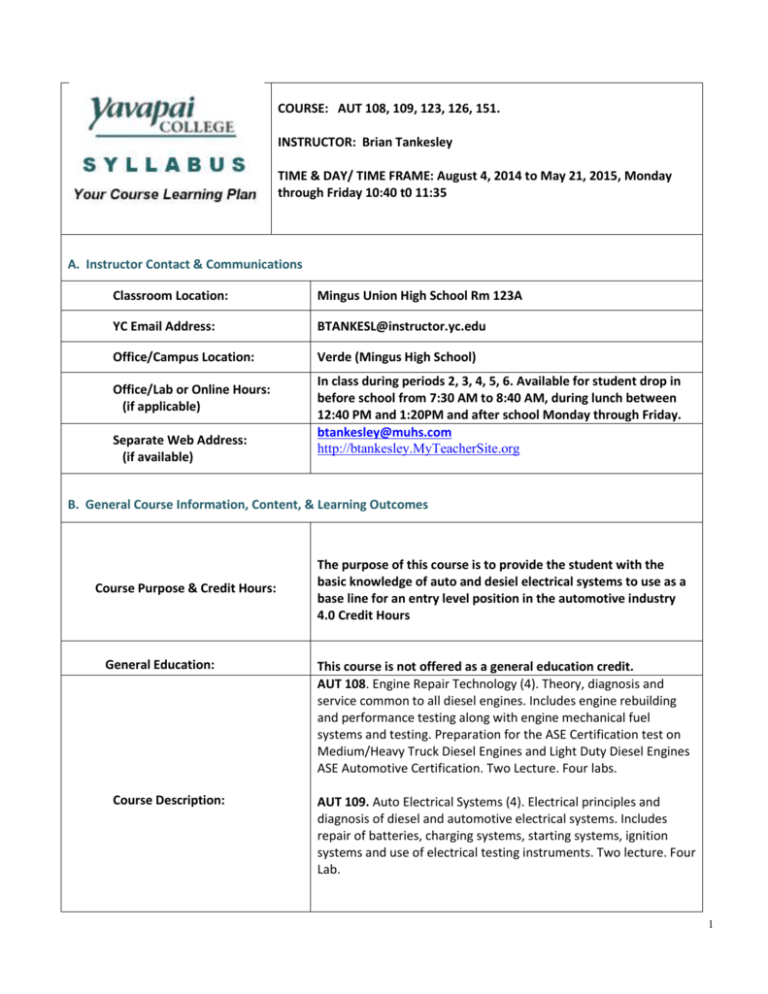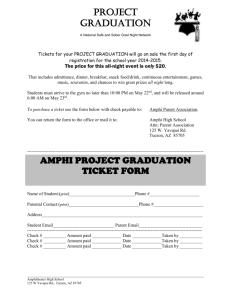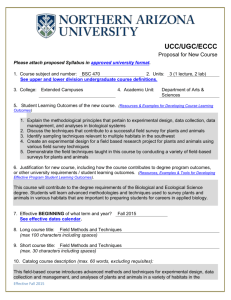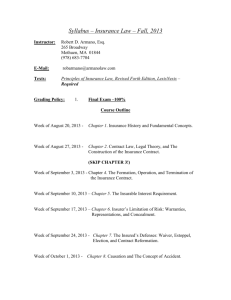Student Code of Conduct
advertisement

COURSE: AUT 108, 109, 123, 126, 151. INSTRUCTOR: Brian Tankesley TIME & DAY/ TIME FRAME: August 4, 2014 to May 21, 2015, Monday through Friday 10:40 t0 11:35 A. Instructor Contact & Communications Classroom Location: Mingus Union High School Rm 123A YC Email Address: BTANKESL@instructor.yc.edu Office/Campus Location: Verde (Mingus High School) Office/Lab or Online Hours: (if applicable) Separate Web Address: (if available) In class during periods 2, 3, 4, 5, 6. Available for student drop in before school from 7:30 AM to 8:40 AM, during lunch between 12:40 PM and 1:20PM and after school Monday through Friday. btankesley@muhs.com http://btankesley.MyTeacherSite.org B. General Course Information, Content, & Learning Outcomes Course Purpose & Credit Hours: General Education: Course Description: The purpose of this course is to provide the student with the basic knowledge of auto and desiel electrical systems to use as a base line for an entry level position in the automotive industry 4.0 Credit Hours This course is not offered as a general education credit. AUT 108. Engine Repair Technology (4). Theory, diagnosis and service common to all diesel engines. Includes engine rebuilding and performance testing along with engine mechanical fuel systems and testing. Preparation for the ASE Certification test on Medium/Heavy Truck Diesel Engines and Light Duty Diesel Engines ASE Automotive Certification. Two Lecture. Four labs. AUT 109. Auto Electrical Systems (4). Electrical principles and diagnosis of diesel and automotive electrical systems. Includes repair of batteries, charging systems, starting systems, ignition systems and use of electrical testing instruments. Two lecture. Four Lab. 1 AUT 123. Automotive Brakes (4). General braking principles, terms, definitions, and other functions connected with the automobile braking system. Correct operation and use of brake servicing equipment for drum and disc brakes. Two lecture. Four labs. AUT 126. Auto Suspension and Steering (4). Principles of suspension system geometry and steering systems operation. Adjustment, correction, repair and replacement components of system components. Two lecture. Four labs. AUT 151. Auto Engine Repair (2). Theory of operation of gasoline powered engines. Includes engine servicing and engine removal and replacement procedures. Four labs. Course Content: Learning Outcomes: Assessment Measures 1. Electrical Theory 2. Batteries 3. Charging system 4. Starting system 5. Ignition system 6. Electrical schematic symbols 7. Digital/Volt/Ohmmeter use 1. Define and use the terminology of electricity. 2. Test, clean, and replace batteries. 3. Test and repair charging systems. 4. Test and repair starting systems. 5. Explain the theory of operation of ignition systems. 6. Use and interpret electrical schematics to diagnosis basic circuit faults. 7. Use the Digital/Volt/Ohmmeter to test current and voltage drops. Assessments will include a written longitudinal pre test in the beginning of the semester, benchmarks at the end of each quarter and a performance and written longitudinal final assessment at the end of the semester. Points values and activities subject to change during the course of the school year. Grading (credit) criteria: 16 quizzes @ 10 pts each 16 labs @ 30pts each 4 Demonstration Speeches @ 100 points each 2 benchmark exams @ 100 points each 1 Mid-term exam @ 100 points 1 Final Exam @150 points Total points 2490 700 points 2 Grade scale: A B C D F C. Textbooks, software, supplies, equipment and/or tools = = = = = 2241- 2490 points 90-100% 1992-2240 points 80-89.9% 1743- 1991 points 70-79.9% 1494- 1742 points 60-69.9% 0- 1492 points 0-59.9% I will do my best to respond to email, voice mail within 24 hours during the week. I will return graded assignments within 7 days after the scheduled due date. If you have questions regarding a discussion or assignment, please contact me prior to the due date so your question can be answered in a timely manner.) Automotive Technologies 4th edition, Jack Erjavec Automotive Technology Jones & Bartlett, CDX Automotive. All students need to aquire a 2” 3 ring binder to hold selected course handouts and a spiral notebook to take notes . Student Resources (as applicable) Campus Resources available through Student Services Campus Resources: (http://www.yc.edu/v4content/student-services/default.htm). All Yavapai College students will be required to use the myYC Portal to myYC Portal: register, add, or drop classes online at http://my.yc.edu/. First-time students will create a log-on username and password. The myYC Portal includes: Links to your College email Your degree audit system – DegreeWorks – to track your progress Registration information - also your schedule View transcripts, update information, and more! For assistance with the Portal, go to http://portalinfo.yc.edu/support.asp Student Email Accounts: Yavapai College requires enrolled students to have an e-mail address to which official College communications can be sent called 'Scholar', accessed by clicking on the email icon in your myYC portal. Students are expected to check their Yavapai College Scholar account for college-related information and for class information and announcements, as directed by the instructor. For assistance, go to http://www.yc.edu/content/myyc/emailinfo.htm Students may elect to forward their e-mail to an address different from their official Yavapai College account (see instructions on website), but assume full responsibility for reading e-mail at the forwarded location. 3 Library Services: Library services are available at the Prescott and Verde Valley Campuses. Both are members of a countywide library network, which provides access to a wide range of information and resources at libraries throughout Yavapai County. Both libraries also include public computer access. Learning Centers & Learning Centers are available on both the Prescott and Verde Valley Tutoring: Campuses. These centers provide a variety of learning support for students including tutoring, adaptive computer and learning equipment for students with disabilities, and a networked general computer lab for registered students. Please call for details: Prescott - 776-2085, or Verde Valley – 6346562. Web link: http://www.yc.edu/v4content/learning-center/ Online resources and Online writing tutoring for any academic subject is available at services: http://www.yc.edu/v4content/learning-center/ Open Computer Labs: Most campuses have open computer lab hours for currently-enrolled students. Please check your campus site for availability and schedules. Important Dates: After the drop/add period closes, students may withdraw until the deadline for student-initiated withdrawals. Withdrawals result in a "W" on the permanent transcript. For semester-length classes 14 weeks in length or longer, the withdrawal deadline is November 1 in the fall semester, April 1 in the spring semester. For classes of 4 days to 14 weeks in length, withdrawals are permitted until the class is 50 percent completed. For classes of 1-3 days in length, withdrawals are permitted until the class is 50 percent completed. A "Y" is noted on the permanent transcript for an administrative withdrawal. More information can be obtained from the Admissions & Registration Office If you do not follow official procedures for withdrawing from a course, failing grades may be posted on the student’s permanent record. Institutional Policies and Instructor Procedures Attendance: Students are expected to attend and participate in all class meetings, laboratories, and field trips. A student who expects to be absent due to another school-sponsored activity or compelling personal reason must make prior arrangements with the instructor. All course work must be made up as directed by the instructor. A student who does not adhere to instructor and College attendance requirements may be dropped from the course as defined in the Yavapai College General Catalog. Course Withdrawal: A student-initiated drop date is established by the College. For Spring semester 2013, this date is Sunday, March 10, 2013. Students are responsible to drop a class through the Self-Service option on the myYC Portal. If you have not withdrawn from a class by the student-initiated drop date, you will receive the letter grade earned in the course at the end of the semester. An instructor may withdraw students from class after the student-initiated date. If a student does not follow official procedures for withdrawing from a course, failing grades may be posted on your student permanent record. 4 An “S” grade is defined as equivalent to a grade of “C” or better on the Satisfactory (S) conventional grading scale of A-F. A course completed with an “S” grade Unsatisfactory (U) Grades indicates appropriate subject area knowledge to satisfy the prerequisite requirement of a related higher-level course. Specified courses are graded only S/U. Students who prefer the S/U grading option must notify the class instructor. Conditions of Satisfactory/Unsatisfactory (S/U) grading: • Since some college and universities limit the number of credits completed with S/U grading that will transfer, or restrict the way that such credits may be applied to degree requirements, it is recommended that students preparing to transfer select the S/U grading option only for elective courses. • A maximum of twelve (12) hours of “S” credit from 100- and 200-level courses may be applied toward Yavapai College graduation requirements. • S/U grading is not an option for courses applied to the Arizona General Education Curriculum (AGEC). • S/U grades are not computed in the student’s Yavapai College grade point average. Honesty in academic work is a central element of the learning environment. Academic Integrity: It will be assumed that you will present your own work. The presentation of another individual’s work as one’s own or the act of seeking unfair academic advantage through cheating, plagiarism or other dishonest means are violations of the College’s Student Code of Conduct. Definitions of plagiarism, cheating, and violation of copyright and penalties for violation are available in the Yavapai College Student Code of Conduct (http://www.yc.edu/v4content/student-services/code-conduct.htm) Student Code of Conduct: Respect for the rights of others and for the College and its property are fundamental expectations for every student. The “Code of Conduct” outlines behavioral expectations, and explains the process for responding to allegations of student misconduct. Students are expected to respond and write in a professional and appropriate manner when activities are assigned to create scenarios, discuss opinions, present on a selected subject, or post to the web discussion board. Inappropriate language or objectionable material will not be tolerated and could result in disciplinary measures and/or a failing grade for the class. Web link for the Student Code of Conduct – http://www.yc.edu/v4content/student-services/code-conduct.htm 5 Internet Downloading: Disability Resources: Yavapai College technological equipment and resources must be used in accordance with the Copyright Guidelines. Use of Yavapai College equipment and resources to illegally copy, download, access, print or store copyrighted material or download pornographic material is strictly prohibited. For example, file swapping of copyrighted material such as music or movies is strictly prohibited. Users found to violate this policy will have their privileges to use Yavapai College technological equipment and resources revoked. Yavapai College is committed to providing educational support services to students with documented disabilities. Accommodations for a student must be arranged by the student through the Disability Resources Coordinator (Prescott Campus: 928-776-2079 or Verde Valley Campus: 928-634-6563). Cell Phone, Pages & Texting: Yavapai College is committed to providing a quality learning environment. All cell phones and pagers must be placed in a non-audible mode while in classrooms, computer labs, the library, the learning center, and testing areas. Cell phones and pagers need to be used outside these facilities. Tobacco Use: Yavapai College is committed to limiting exposure to the harmful effects of primary and secondary smoke to campus students, visitors, and employees. If you use the facilities at Yavapai College, we comply with ASRS 36-301.01, Smoke Free AZ. Smoking is prohibited indoors and 25 feet from all doors, windows and vents. In order to reduce the harmful effects of tobacco use and maintain a healthful working and learning environment, the district prohibits the use of tobacco except in specific areas. Tobacco use on college property is defined as lighted pipes, cigars, cigarettes, and the use of snuff and smokeless tobacco in any form. Additional Instructor Information & Procedures: Website: http://btankesley.MyTeacherSite.org Phone Number: 928-649-4449 6 Courses: SYLLABUS AGREEMENT Instructor: AUT 108, AUT 109, AUT 123. AUT 126, AUT 151 Brian Tankesley I have been provided with a copy of the syllabus for this course in either electronic or paper format. I have read this syllabus and have been given a chance to ask questions about it. I understand the syllabus requirements and agree to them. _____________________________________ _______________________________ Student Signature Date 7 Classroom Rules Arrive prepared and on time. Wear appropriate clothing. Keep hands feet and objects to yourself. Be respectful. The use of electronic devices is not permitted without teacher permission. Shop Rules Always wear safety glasses. Closed toes shoes must be worn in shop at all times. Food and drinks are not permitted. The use of electronic devices is not permitted without teacher permission. Students are to stay busy at all times. Consequences in order One verbal warning Individual conference ( lunch detention) Contact parents Conference with counselor and parents. ALC referral. Rules and Procedures Explanation Classroom To ensure every student receives a meaningful opportunity inside of the classroom, these rules will be strictly adhered to. Any misbehavior will affect everyone’s ability to understand and learn the content we have prepared. Any misbehavior will have consequences that may include expulsion from this class. A successful student in this class will be an exemplary example to all who participates. Shop Rules Our shop rules are developed to ensure the safety of the students and others around them. These rules are to be adhered to at all times. If they are not adhered to, actions will be taken for the safety of all parties involved. Some of the most violated rules are wearing open toed shoes such as sandals, eating in the shop, and not wearing safety glasses. Closed toed shoes are a necessity to prevent permanent injury from, sharp, hot, and heavy objects located in the shop area. If a student does not have closed toe shoes an alternative assignment will be given which prevents them from participating in lab activities. Due to the abundance of clothing that does not meet safety regulations in the shop, it is at the instructor’s discretion as to what appropriate personal protective clothing or equipment is to be allowed in the shop environment. 8 Welcome to Automotive Technology at Mingus Union High School Welcome to Auto Technology at Mingus Union High School. I am very excited to share my knowledge with you and create an appreciation for career and technical education. There are many attributes that I would like to share with you about our program. Our program here at Mingus is articulated with the automotive program at Yavapai College. This means that we teach the same content yet at different facilities. The students who pass auto 2 and 3 with a C or higher will gain a college credit from Yavapai. In addition to getting college credit, the students who complete all three courses may receive a certificate in automotive technology through Yavapai College and walk in their graduation ceremony. Other attributes include the participation in Skills USA. Skills USA is a student organization that prepares students to become skilled in the workplace. Through Skills USA students will learn how to conduct job interviews, write resumes, compete in competitions locally and possibly travel nationally. The automotive program that has been created over the last 30 years focuses on the success of all students and will continue to be committed to educational excellence. Your student should bring home a syllabus that contains all policies and procedures that are expected to be followed in our class. The policies set forth in the syllabus are for the benefit of both the student and Mr. Tankesley. Rules, procedures and consequences are necessary for any class to provide the best opportunities available for student achievement. The students are my number one priority and I have very high expectations that encourage them to strive for excellence. Please take the time to review my expectations and feel free to contact me during the time listed on the syllabus. On the back of this sheet is some information I need from you (the parent) that will help your child become successful in the classroom. Information includes phone number, e-mail, and the best time to contact you I will contact you for reasons such as praise, discipline, events, progress, and to let you know how well your child is doing in class. Thank you, Brian Tankesley 9 Student and Parent Information Student’s first and last name_________________________________________ Contact information: Parent phone number- cell_________________, Work________________ Parent e-mail_____________________ Student e-mail___________________ (homework purposes) Other contact information______________________ Best time to contact parents_______________ Please provide any information that would help me better accommodate your child such as culture, background knowledge, learning strengths and weaknesses. Syllabus receipt: (Print Student name) I _____________________have read and understand Mr. Tankesley’s course syllabus and agree to follow the rules listed. I also agree that I now represent Mingus Union High School and my actions inside and outside of the classroom affect myself and Mingus directly. My achievements in this school depend on the effort that I put into all of my classes and I agree to do my best to succeed. X_________________________________ (Parent signature) X_________________________________ (Student signature) 10







